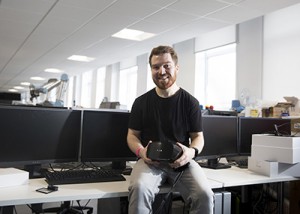
An MSc student who has stuttered since the age of six is using virtual reality technology to help rehabilitate people with speech impediments. Gareth Walkom, 24, an MSc Medical Product Design student at Nottingham Trent University, is developing software to allow people to confront social anxieties in a virtual environment. The technology provides exposure therapy for simulated situations which trigger anxiety. By repeated exposure to such situations a person can overcome their fear to better prepare themselves for anxiety-provoking real-life situations.
Gareth’s design – which includes advanced eye tracking technology within a VR headset – includes a range of scenarios and provides feedback on a user’s anxiety levels, showing progress and indicating ways to improve. Tests undertaken with a stutter self-help group showed that participants’ anxiety levels decreased over repeated sessions after using Gareth’s software. Participants also showed improvement concerning their speech. “I know first-hand how much impact a stutter can have on a person’s life, so I wanted to do something that has the potential to make a huge difference in the lives of other people who stutter,” said Gareth, originally from Basingstoke in Hampshire, who is studying in the School of Architecture, Design and the Built Environment. “For a person who stutters, talking in front of an audience, for instance, can be an intimidating and heart-raising task. But with the growing availability of virtual reality technology, people could practice exposure therapy in ways previously unavailable to them from the comfort of their own home.”
The technology would also provide feedback on the wearer’s eye activity, as gaze behaviour plays an important part in stuttering therapy. “When someone stutters, they can also involuntarily look away from the person they’re speaking to and their eyelids may close or flicker,” said Gareth. “So it is important to use headsets which track where the person looks during social interactions and whether they look at the person’s face in order to improve their gaze.”
According to The Stuttering Foundation, more than 70 million people worldwide have a stutter, equal to one per cent of the global population. Professor Philip Breedon, leader of Nottingham Trent University’s Design for Health and Wellbeing Research Group, who supervised the study, said: “Gareth has taken a subject matter which is personal to him and delivered a research project which has the potential to change people’s lives. “By utilising the growth in virtual reality technology, his research has the potential to help people who experience a whole range of social anxieties, including those who stutter. It’s a fantastic example of how design, combined with advanced technologies, has the potential to improve the health and wellbeing of millions of people around the globe.”
Further information from members of the public can be obtained by liaising with Gareth directly, via gareth.walkom2012@my.ntu.ac.uk.
• Press enquiries please contact Chris Birkle, press officer, on telephone +44 (0)115 848 2310, or via email,
or Helen Breese, senior press officer, on telephone +44 (0)115 848 8751, or via email
• Nottingham Trent University is a recent recipient of the Queen’s Anniversary Prize for Higher and Further Education. It is the highest national honour for a UK university and recognises the institution’s world-class research. Pioneering projects to improve weapons and explosives detection in luggage, enable safer production of powdered infant formula, and combat food fraud, led to the prestigious award
• Small and medium sized businesses in Derbyshire & Nottingham that would like to access or find out more about using eye-tracking Fove technology can do so through Enabling Innovation, for free. To find out more please contact innovation advisor Paul Found on 0115 848 8691
Please submit your comments below.
Do you have something to say about this or any other school management issue which you'd like to share? Then write for us!






